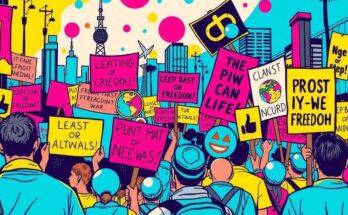The swift arrest of former President Duterte after an ICC warrant indicates substantial political maneuvering amid escalating tensions between the Marcos and Duterte families. Their previously close alliance has fractured over allegations against Sara Duterte and unmet promises of protection from prosecution. Forthcoming Senate actions regarding her impeachment and upcoming elections could drastically impact the political landscape in the Philippines, revealing the vulnerabilities of entrenched political dynasties.
The swift arrest of former Philippine President Rodrigo Duterte upon his return from Hong Kong underscores considerable planning beyond mere happenstance. Following an International Criminal Court (ICC) warrant, Duterte was rapidly transported to the Netherlands. This sequence of events suggests deeper political machinations at play, especially given the tensions between the powerful Marcos clan and the Dutertes, from whom Duterte posed a significant threat.
Historically, the relationship between the Duterte and Marcos families was symbiotic. In 2016, the Marcos clan supported Duterte’s presidential run, leading to Duterte’s governmental actions to honor the late Ferdinand Marcos Sr. by allowing his burial at the Heroes’ Cemetery. This political alliance reached a crescendo with Ferdinand Marcos Jr. sharing a ticket with Sara Duterte in the recent elections, seemingly solidifying their dominance over Philippine politics, particularly in Mindanao.
However, the alliance began to deteriorate, particularly following allegations against Sara Duterte regarding financial misconduct involving substantial sums of intelligence and educational funds. Recent findings included a troubling ledger of payments made to fictitious entities. House Deputy Majority Leader Francisco Paolo Ortega V. highlighted the absurdity of these names, muddling the political landscape further.
Tensions escalated when accusations emerged that Marcos failed to uphold his commitment to protect Duterte from prosecution related to the controversial anti-drug campaign, which led to an estimated 20,000 deaths. The impeachment of Sara Duterte on Feb. 5 marked an unprecedented political maneuver, with 215 representatives pressing charges against her, igniting a significant political showdown likely to culminate in a Senate trial.
The impeachment journey continues, with uncertainties looming over whether the Senate can achieve the necessary two-thirds majority for conviction. Despite remaining a formidable family in Philippine politics, support among representatives in Mindanao has notably decreased, and recent polls indicate a diminished approval rating for Sara Duterte, suggesting a potential backlash.
As the mid-term elections approach, the fate of two key senators with ties to the Dutertes remains uncertain amidst faltering public support for Sara. Continued threats from both sides reflect rising tensions, with former President Duterte’s controversial jest about senatorial candidates prompting legal consequences.
President Marcos’s role in distancing himself from the impeachment process suggests underlying apprehensions regarding Sara’s potential resurgence in political capital should she overcome the charges. Meanwhile, the ICC’s jurisdiction over Duterte provides an opportunity for the Marcos family to consolidate power amid fears of future retaliation from the Dutertes.
As Rodrigo Duterte, now 79 and health-compromised, prepares for his legal battles, concerns grow that his death could elevate him to martyrdom, emboldening his family’s cause. The shifting political loyalty within military and police factions adds further complexity to an already divisive situation. The unfolding scenario exemplifies a battle for supremacy among Philippine dynasties; as long-established political entities confront the threat posed by emerging families, the future of Philippine governance hangs precariously in the balance.
Zachary Abuza serves as a professor at the National War College and an adjunct at Georgetown University. The views expressed herein reflect his personal opinion and do not represent official positions of any associated institutions.
The political landscape in the Philippines is currently defined by a bitter rivalry between the Marcos and Duterte clans, underscored by recent events such as the arrest of Rodrigo Duterte by the ICC and the unprecedented impeachment of Sara Duterte. This conflict reveals the fragility of political alliances and the shifting loyalties among traditional power players in the nation. As the situation evolves, the outcomes of the upcoming elections and potential Senate actions will likely have lasting implications for both dynasties and the future of Philippine politics.
Original Source: www.benarnews.org




